Information?

Whether you’re missing one tooth or all the teeth in your smile, you’re more than likely going to experience some hiccups throughout your day-to-day as a result. With dental implants at Brush Dental, your tooth loss is only a temporary concern. Feel free to give our office a call today to learn more about tooth replacement with dental implants and whether they are right for you!


Dental implants are prosthetic tooth replacements designed to mimic the roots of teeth while simultaneously holding a dedicated restoration. The titanium post integrates with the jawbone tissue, while an abutment (a small connector) attaches a restoration (either a crown, bridge, or denture) to the implant. This ensures long-term stability and longevity that is truly unmatched.

When receiving dental implants, you must understand that it requires multiple steps for these prosthetics to successfully integrate with the underlying bone as well as sufficiently support a new set of teeth. Although it’s natural to desire a complete smile in less time, the preparation, placement, healing, and restoration of your new smile should not be rushed. If you would like to learn more about what you can expect when choosing dental implants, review the step-by-step process below.

The process of receiving a new smile begins with a scheduled consultation. You will meet with one of our esteemed dentists to discuss your goals, concerns, and status of your oral and overall health. Since many factors can determine your candidacy for treatment as well as the type of restoration you will need, we must thoroughly examine your mouth and determine the density of your jawbone.
Should we discover that your jawbone has weakened or that you have gum disease or tooth decay, we will suggest additional treatment, such as bone grafting, gum disease treatment, or tooth extraction, before clearing you for dental implant surgery.

Placing dental implants oftentimes requires dentists to refer patients to outside specialists; however, at Brush Dental, we are pleased to keep the entire process in-house, including the surgical aspect of care. Instead of going elsewhere to receive your implant posts, our team can safely, comfortably, and conveniently take care of the placement of your new teeth.
We’ll begin by using local anesthesia to numb your mouth before carefully inserting each implant post into the appropriate area of your gumline. After making a small incision, we will place the posts before closing the gum tissue and placing protective healing caps over your implants. This will keep them safe until it’s time to add your metal abutments.
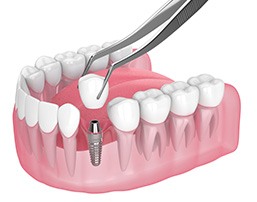
Once your procedure is complete, you will be required to return home to recover. While most patients can resume normal activity after a few days, it’s important to remember that the mouth is still healing, and it can take anywhere from 4-6 months for osseointegration to be successful. During this time, your implants will fuse with your jawbone, so you’ll need to make sure you’re following your dentist’s instructions to avoid complications.
After you are fully healed, you will return to our dental office to receive your metal abutments, which will attach to your implants and hold your restoration in place.
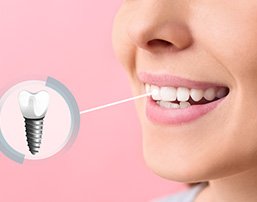
As you near the end of your dental implant process, the last step is to have your custom restoration installed. Using digital impressions taken of your teeth, lab technicians will create a beautiful crown, dental bridge, or denture, which will be secured to the tops of your implants. You can expect that once it is attached, our dentists will give your smile one final polish and ensure that it fits correctly and comfortably.

It can be hard trying to justify why it’s better to choose a more expensive method of tooth replacement over traditional dentures and dental bridges. However, when you consider the many benefits of dental implants in Royse City, you begin to see how impactful these prosthetics can be to the longevity of your smile. Below you will find a more comprehensive list of advantages that come with choosing dental implants. If you have any questions, please don’t hesitate to contact our office .




No matter how many teeth you’ve lost, dental implants in Royse City could help your smile. It often doesn't take much to qualify for these tooth replacements. Still, you should consult our dentists before you fully commit to them. They can assess your mouth to see if dental implants could help and draft a treatment plan accordingly. If you’d like to learn more, just keep reading or call us in the coming days!
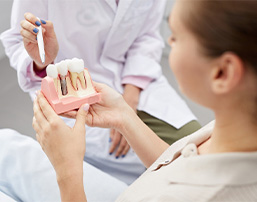
Most healthy adults can qualify for dental implants, as they don’t require much besides tooth loss. That said, dental implant treatment does benefit some patients more than others. The ideal candidates for this procedure tend to have these three traits:
You can still become an implant candidate if you lack the above traits. You’ll simply need some preliminary treatments first– services like tooth extractions, gum disease therapy, bone grafts, etc. By doing so, your mouth and jaw will be strong enough to support dental implants. We can then draft a treatment plan around how many teeth you’re missing.
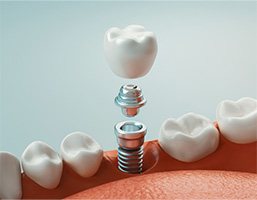
A single implant post and crown should be enough when you're just missing one tooth. This pair can restore your smile seamlessly and last a long time – even longer than a dental bridge! As for its placement, the dentist likely won’t need to alter your adjacent teeth. Such alterations would just weaken them and make them sensitive.
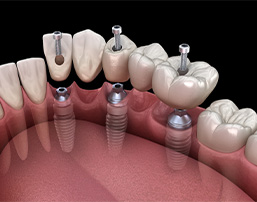
You may want to consider an implant bridge if you’re missing multiple adjacent teeth. For this option, two implant posts support the device instead of dental crowns. That means it doesn’t rely on natural teeth like a standard dental bridge does. Therefore, the dentist won’t need to remove any existing enamel.
For many missing teeth throughout the mouth, a partial implant denture would work better. This appliance uses several implant posts to anchor itself in place.
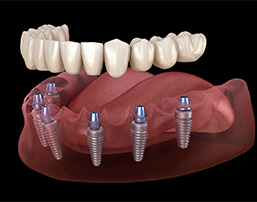
If you’ve lost (or will soon lose) all your natural teeth, look into an implant denture. It can restore an entire arch at once with just a few well-placed dental implants. Better yet, this denture won’t slip around like a typical one sometimes will. It uses a minimal number of implant posts for the greatest degree of stability and functionality.

The cost of dental implants in Royse City should never prevent you from replacing your lost teeth. Although there’s not a flat rate for the treatment, we strive to keep a complete smile within everyone’s budget. After examining your mouth, we’ll provide you with a personalized estimate and discuss your financial options to invest in the next best thing to your real teeth.

The process will involve multiple steps, each with separate costs. You won’t have to come up with the entire amount up front, making it easier to budget your procedure. Although every plan is different, you can expect your estimate to include:

A dental implant replicates both the root and the crown. Your estimate will include each part of your replacement tooth, including:
Your implant dentist in Royse City will discuss how many of each you’ll require to restore your smile.

Dental implants in Royse City cost more upfront than traditional prosthetics, but they are the most affordable long-term. Unlike conventional bridges and dentures, dental implants don’t need to be replaced every few years. They can last for decades to save money down the road. Not to mention, a dental implant will keep your jaw strong to avoid many common issues caused by missing teeth. You’ll reduce your overall oral health expenses by preventing additional treatments later.

Your dental insurance likely won’t pay the entire amount; however, you can use your coverage to offset certain steps in your treatment, like the consultation, tooth extractions, or restorations. A member of our team will work on your behalf with your dental insurance to maximize your annual benefits.

Your financial situation shouldn’t stand in your way of enjoying a complete smile. Besides using your dental insurance, we accept various payment methods, including:
You’ll know exactly what you’ll have to pay before committing to anything. If you have any questions about your payment options, or you’re ready to schedule your consultation, contact our office today.

The recovery process is a crucial part of ensuring that your dental implants heal properly so they can exert maximum chewing pressure and last for as long as possible. Here’s a brief guide to what you can expect after having your implants placed as well as a few tips for staying comfortable and avoiding complications. However, don’t hesitate to contact our Royse City office if you experience any abnormal issues such as intense pain while chewing or your implant feeling loose.

The most important thing after dental implant surgery is to leave the blood clot that forms over the surgical site undisturbed so that the tissues it protects can heal smoothly. To avoid harming your new implant, follow these rules:

You may experience a few common and mild side effects during the first few days after receiving dental implants. These can include:

It’s best to stick to a diet of soft, non-abrasive foods for the first few days after dental implant placement surgery. A few excellent choices include:
Avoid items that are especially hot, as these can harm the healing surgical site. You can return to your normal eating habits as soon as you can do so comfortably, but we recommend not overindulging in tough or crunchy items and refraining from chewing over the site of the implant.
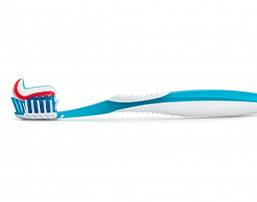
It’s okay to brush your teeth normally the day after surgery, but be very careful when cleaning around the surgical sites. We also recommend rinsing your mouth with a mixture of salt and water after meals to reduce food debris and swelling. While you may be prescribed a special mouthwash, avoid using products such as Scope or Listerine that contain high levels of alcohol.
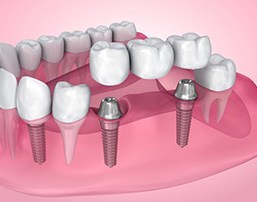
When the time comes to attach your teeth, you can rest assured that the hard part of the process is already over. While you may experience some minor sensitivity after receiving your crown, bridge, or denture, this should be temporary and easy to control with pain medication. You should not experience any swelling or bleeding afterward, meaning that you’ll be ready to show off your new smile that day.

Dental implants can last for decades (and even for life), but only if you take care of them. After all, they are not indestructible. Without a strong oral care regimen, which includes at-home oral care and dental visits, they are inherently at risk of developing problems later. Below, you’ll find a handful of the most useful steps to take to ensure your dental implants serve you well and continue looking immaculate in the long-term.

Brushing twice a day, flossing daily, and ideally including an alcohol-free oral rinse into your routine will all work to prevent plaque buildup on your dental implants, gums, and natural teeth. Even though the restorations attached to your dental implants will not develop decay, the gum tissue surrounding them can become infected without routine oral care. This can cause them to recede, increasing your risk of dental implant failure. Under no circumstances should you skip your at-home oral hygiene following dental implant placement.

Keeping a balanced diet to protect your oral health and dental implants is more important than you think. Having a diet containing many fruits, vegetables, lean proteins, dairy products, and whole grains will ensure your mouth gets what it needs to remain healthy. This includes calcium, phosphorus, Vitamin A, Vitamin C, and many other nutrients. With that said, avoid foods that contain lots of sugar and starch as these can make plaque production more likely. Reduce consumption of foods that can crack or chip teeth, including hard candies and ice cubes.

There’s no reason for you to use your teeth to perform tasks better suited for a tool. For example, if you need to open a package, use a box cutter or pair of scissors. Similarly, you should have a bottle opener nearby when it comes time to enjoy your favorite beverage. If you tend to bite your fingernails to trim them, don’t chew on them with your dental implants. Use a nail clipper, which is safer for your teeth and more sanitary. Bite on pens and pencils to relieve stress? Find something to replace this habit, such as squeezing a stress ball.

Those who are active should wear a custom-made mouthguard whenever playing contact sports, including football, basketball, hockey, wrestling, karate, or similar activities. This will help prevent you from damaging your dental implants in the event you take a bad fall or experience sudden facial trauma. Additionally, using a nightguard if you grind and clench your teeth at night is vital to preventing damage to your implant restorations (and the implant itself).

Biannual dental exams and cleanings work two-fold to protect your dental implants and oral health. For one, they let us confirm that your dental implants are healthy and your at-home oral hygiene is working as intended. During your cleaning, we’ll make sure no residual plaque or tartar buildup remains on your teeth, gums, or dental implants before you leave.
Most patients can expect their dental implants to last well over 30 years. However, that’s only the case if you take proper care of them. Their exact lifespan depends heavily on your oral health and lifestyle. To help your newly rebuilt smile last as long as possible, you must:
Yes, especially when they’re placed by a qualified dental professional. If we find issues like insufficient jawbone density or gum disease during your consultation, we’ll recommend certain preliminary treatments to make dental implant surgery safer and more successful. For patients with health conditions like diabetes or cancer, we can discuss ways to make the procedure and healing process less risky.
Dental implants have an impressive success rate of about 95% even 20 years after they’ve been placed! Of course, the success rate of your dental implants will depend on how well you take care of them. It can also vary based on the location of the implant site. For example, molars receive more strain from chewing than the front teeth, which means they’re slightly more likely to fail.
Typically, people can expect to continue their usual activities the day following their surgery. However, it’s strongly recommended that you avoid intense physical exercise for the first week or so as it could delay healing. Any bleeding and swelling you experience should gradually improve after a couple of days. You can alleviate your discomfort by taking prescribed or over-the-counter pain medication as instructed and using cold compresses. Keep in mind that it could take up to six months for the implants to fuse with the jawbone via osseointegration.
